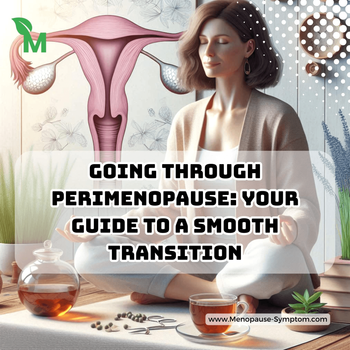Perimenopause, also known as the menopausal transition, is when the body stops ovulating, menstruation stops, and fertility is no longer possible. This period can last from 2 to 5 years depending on the individual.
This stage not only marks the body's transformation but also opens up many challenges that women need to face. Understanding perimenopause and developing a reasonable diet plan are very important to maintain optimal health during this stage.
During perimenopause, many women experience symptoms such as hot flashes, difficulty sleeping, and mood swings. To alleviate these symptoms, a sensible diet plan can help women get through this phase more easily. A balanced diet not only supports the immune system but also helps balance hormones and boost mental health.
Foods to Prioritize in Your Diet Plan
When creating a diet plan for optimal health during perimenopause, food choices are important. Here are some foods to prioritize:
Green vegetables and fruits: Green vegetables and fruits are a rich source of vitamins and minerals. They are also rich in fiber, which helps improve digestion and regulate weight. Green vegetables such as broccoli, kale, and fruits such as berries, apples are great choices.
Whole Grains: Whole grains like quinoa and oats not only provide energy but are also rich in fiber and B vitamins. They help maintain stable blood sugar levels, which is especially important during perimenopause when hormones can affect appetite.
Healthy Fats: Omega-3s and Omega-6s from fish like salmon and sardines, and from nuts and avocados are essential for the body. Healthy fats help reduce inflammation, support heart health, and improve mood, all of which are important during perimenopause.
Quality Proteins: Proteins from lean meats, beans, and dairy products are essential for rebuilding and maintaining muscle tissue. They help control weight and keep you feeling full longer.
How to Prepare Food
Not only the food you choose, but how you prepare it also plays an important role in your diet plan for optimal health. Avoid fried foods or foods high in sugar and salt. Instead, try baking, steaming, or stir-fried with a little olive oil. This way, you not only preserve the nutrients, but also help your body absorb them more effectively.
The Importance of Vitamins and Minerals
During perimenopause, vitamins and minerals such as calcium, vitamin D, and vitamin B are needed to support bone health and hormone balance. You can find calcium in dairy products, dark green vegetables, and nuts. Vitamin D can be synthesized from sunlight, or you can find it in fish and eggs. Vitamin B, which is abundant in whole grains and animal foods, is important for mental health.
Daily living habits
In addition to diet, daily living habits also need to be focused on. An optimistic spirit and self-motivation will help you overcome perimenopause easily:
Exercise regularly: A regular exercise regimen not only helps improve physical health but also helps reduce stress. You can try activities such as yoga, walking, or dancing, they help improve health. Remember, there cannot be a healthy spirit in a weak body.
Enough and quality sleep: Getting enough sleep and sleeping on time play a very important role. Because our body always needs sleep to recover and regenerate, it is even more important during perimenopause. Create a comfortable environment around your bed, stay away from electronic devices before bedtime to have a deeper sleep.
Reduce stress: Relaxation methods such as meditation, reading or participating in cultural and artistic activities will help you connect socially and relieve stress. These activities always create a good environment for your mental health.
Don't forget to have regular health check-ups
Finally, regular health check-ups during perimenopause are essential to detect possible health problems early. You should consult your doctor about the necessary tests to monitor your health.
Conclusion
Perimenopause is not a scary stage, but a natural transition in life. With a suitable diet plan, positive lifestyle habits and close health monitoring, you can not only overcome this stage but also feel healthier and more confident than ever. Remember, health is the most valuable asset, and taking care of yourself during perimenopause will help you enjoy life to the fullest. Take this as an opportunity to refresh yourself, develop healthy habits and live happily and positively every day!
Key points:
· Perimenopause and diet: A balanced diet can help alleviate common symptoms like hot flashes and mood swings.
· Essential nutrients: Focus on consuming plenty of fruits, vegetables, whole grains, lean proteins, and healthy fats.
· Food preparation: Prioritize cooking methods like baking, steaming, and sautéing to preserve nutrients.
· Vitamins and minerals: Ensure adequate intake of calcium, vitamin D, and vitamin B for bone health and overall well-being.
· Lifestyle factors: Combine a healthy diet with regular exercise, sufficient sleep, and stress management for optimal results.
· Regular check-ups: Schedule regular health check-ups to monitor overall health and address any concerns.
Source: Team MPS compiled, analyzed and wrote. Please dont reup without source. Many thanks.

Going Through Perimenopause: Your Guide to a Smooth Transition
Invalid Date
Going through perimenopause can often feel like venturing into uncharted territory, but understanding this transition can help you embrace the changes with confidence.

Beyond Hot Flashes: A Holistic Approach To Perimenopause
Invalid Date
Perimenopause is an important stage in a woman's life, but not everyone really understands it. Many people only know perimenopause through hot flashes, but in fact, this is a remarkable transition period with many other changes.

Don't Ignore These Unusual Perimenopause Symptoms
Invalid Date
